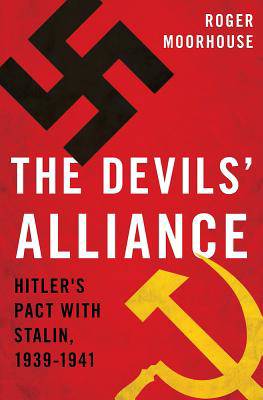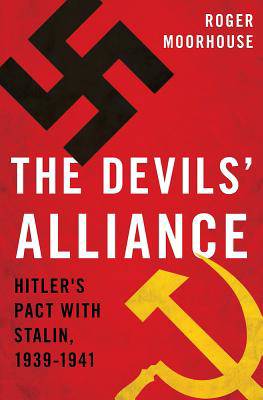
Wil je zeker zijn dat je cadeautjes op tijd onder de kerstboom liggen? Onze winkels ontvangen jou met open armen. Nu met extra openingsuren op zondag!
- Afhalen na 1 uur in een winkel met voorraad
- Gratis thuislevering in België vanaf € 30
- Ruim aanbod met 7 miljoen producten
Wil je zeker zijn dat je cadeautjes op tijd onder de kerstboom liggen? Onze winkels ontvangen jou met open armen. Nu met extra openingsuren op zondag!
- Afhalen na 1 uur in een winkel met voorraad
- Gratis thuislevering in België vanaf € 30
- Ruim aanbod met 7 miljoen producten
Zoeken
€ 41,95
+ 83 punten
Uitvoering
Omschrijving
History remembers the Soviets and the Nazis as bitter enemies and ideological rivals, the two mammoth and opposing totalitarian regimes of World War II whose conflict would be the defining and deciding clash of the war. Yet for nearly a third of the conflict's entire timespan, Hitler and Stalin stood side by side as partners. The Pact that they agreed had a profound -- and bloody -- impact on Europe, and is fundamental to understanding the development and denouement of the war. In The Devils' Alliance, acclaimed historian Roger Moorhouse explores the causes and implications of the Nazi-Soviet Pact, an unholy covenant whose creation and dissolution were crucial turning points in World War II. Forged by the German foreign minister, Joachim von Ribbentrop, and his Soviet counterpart, Vyacheslav Molotov, the nonaggression treaty briefly united the two powers in a brutally efficient collaboration. Together, the Germans and Soviets quickly conquered and divided central and eastern Europe -- Poland, the Baltic States, Finland, and Bessarabia -- and the human cost was staggering: during the two years of the pact hundreds of thousands of people in central and eastern Europe caught between Hitler and Stalin were expropriated, deported, or killed. Fortunately for the Allies, the partnership ultimately soured, resulting in the surprise June 1941 German invasion of the Soviet Union. Ironically, however, the powers' exchange of materiel, blueprints, and technological expertise during the period of the Pact made possible a far more bloody and protracted war than would have otherwise been conceivable. Combining comprehensive research with a gripping narrative, The Devils' Alliance is the authoritative history of the Nazi-Soviet Pact -- and a portrait of the people whose lives were irrevocably altered by Hitler and Stalin's nefarious collaboration.
Specificaties
Betrokkenen
- Auteur(s):
- Uitgeverij:
Inhoud
- Aantal bladzijden:
- 432
- Taal:
- Engels
Eigenschappen
- Productcode (EAN):
- 9780465030750
- Verschijningsdatum:
- 14/10/2014
- Uitvoering:
- Hardcover
- Formaat:
- Genaaid
- Afmetingen:
- 162 mm x 244 mm
- Gewicht:
- 684 g

Alleen bij Standaard Boekhandel
+ 83 punten op je klantenkaart van Standaard Boekhandel
Beoordelingen
We publiceren alleen reviews die voldoen aan de voorwaarden voor reviews. Bekijk onze voorwaarden voor reviews.











